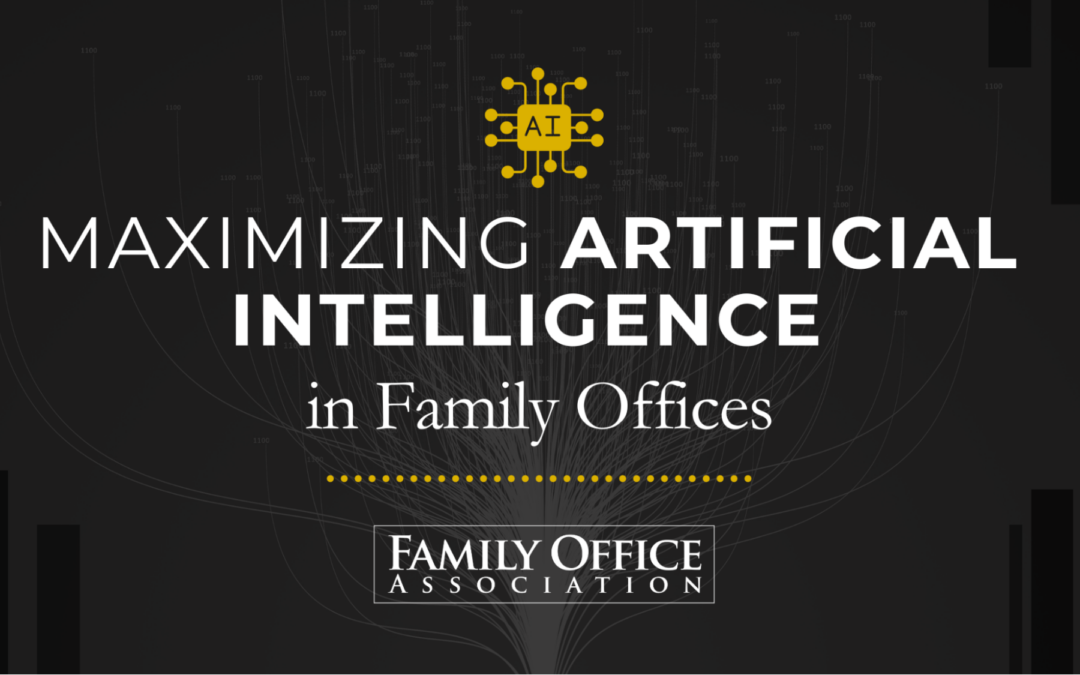In the fast-paced world of finance and investment, staying ahead of the curve is essential for sustained success. As technology continues to evolve, family offices, entities established to manage the wealth of high-net-worth families, are increasingly turning to artificial intelligence (AI) to gain a competitive edge. From algorithmic trading to portfolio optimization, AI presents many opportunities for family offices to enhance their operations and investment strategies. However, effectively harnessing the power of AI requires careful planning and management.
Understanding the Potential of AI in Family Offices
AI encompasses a broad range of technologies that enable machines to perform tasks that traditionally require a human touch. In family offices, AI can be utilized in various ways to streamline processes, improve decision-making, and drive better investment outcomes.
AI can become extremely helpful regarding data analysis and insights. Family offices generate and have access to vast amounts of data related to investments, market trends, and economic indicators. AI-powered analytics tools can sift through this data quickly and efficiently, extracting valuable insights that may not be apparent through traditional analysis methods. By leveraging AI for these tasks, family offices can make more informed investment decisions and identify growth opportunities.
Risk management is an understood aspect of investment management. Using AI algorithms, family offices can mitigate potential losses in real-time and protect their client’s wealth. Machine learning models can analyze historical data to predict market trends and identify patterns that may indicate impending risks, enabling proactive risk management strategies.
Additionally, AI-driven portfolio optimization tools can help family offices construct and manage diversified investment portfolios tailored to their clients’ risk preferences and financial goals. By incorporating factors such as asset correlations, market volatility, and liquidity constraints, AI algorithms can optimize portfolio allocations to maximize returns while minimizing risk. Also, AI-powered trading algorithms can execute trades quickly and precisely, capitalizing on market inefficiencies and opportunities. Family offices can reduce human error and emotional biases by automating trading processes, resulting in more consistent and profitable trading strategies.
Challenges and Considerations of AI
While the potential benefits of AI in family offices are significant, several challenges and considerations need to be addressed to ensure the successful implementation and management of AI technologies.
- Data Privacy and Security
Family offices handle sensitive financial information, making data privacy and security paramount concerns. Robust cybersecurity measures must be implemented to protect client data from unauthorized access and cyber threats.
- Ethical and Regulatory Compliance
The use of AI in finance raises ethical and regulatory considerations related to transparency, fairness, and accountability. To mitigate legal and reputational risks, family offices must adhere to applicable regulations and industry standards governing the use of AI, such as GDPR and SEC guidelines.
- Talent and Skills Gap
Implementing AI technologies requires specialized knowledge and expertise in data science, machine learning, and programming. Family offices may need to invest in training programs or hire qualified professionals to build and maintain AI systems effectively.
- Integration and Adoption
Integrating AI into existing workflows and systems can be challenging, especially for family offices with legacy infrastructure. It is crucial to develop a comprehensive implementation strategy and provide adequate training and support to facilitate the adoption of AI technologies.
Strategies for Effective AI Management
Family offices should adopt a proactive approach to managing AI technologies to maximize the benefits of AI and mitigate potential risks.
Here are some strategies to consider:
Develop a Clear AI Strategy: Define clear objectives and goals for implementing AI within the family office by identifying specific use cases and applications where AI can add value and prioritize initiatives based on their potential impact on investment outcomes and operational efficiency.
Invest in Data Infrastructure: Establish a robust data infrastructure to support AI initiatives, including data collection, storage, and processing capabilities, implementing data governance policies and procedures to ensure data quality and integrity.
Foster a Culture of Innovation: Encourage innovation and continuous learning within the family office to embrace new technologies and ideas. Additionally, provide opportunities for employees to develop their skills in AI and foster collaboration between different teams and departments.
Collaborate with External Partners: Partner with external vendors, consultants, or research institutions with expertise in AI to augment internal capabilities and stay up-to-date with the latest developments in the field.
Monitor and Evaluate Performance: Continuously monitor the performance of AI systems and algorithms to ensure they achieve the desired outcomes. Use key performance indicators (KPIs) and metrics to track progress and adjust as needed to optimize performance.
AI can potentially revolutionize how family offices operate and manage investments. By harnessing the power of AI, family offices can gain a competitive edge, improve decision-making, and deliver superior investment outcomes for their clients.
If you have further questions or wish to enhance your family office, contact the team at Family Office Association.

